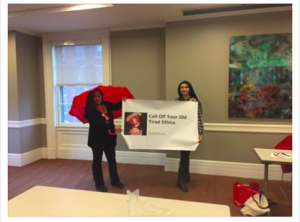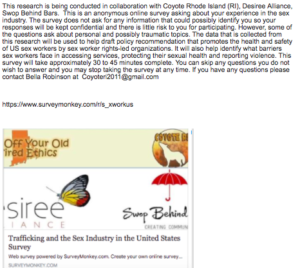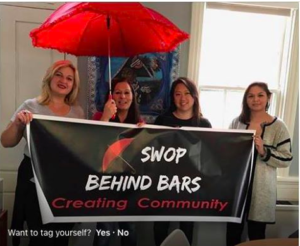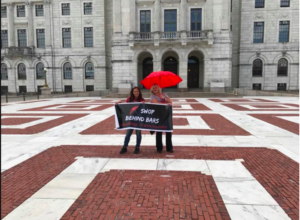Social Change Practitioner Interview/Profile
Prostitute to Sex Worker Advocate:
Bella Robinson, Executive Director of COYOTE, RI
Background Information
COYOTE is a sex worker rights organization, which stands for Call Off Your Old Tired Ethics. This title is a reflection of the fact that sex work tends to be stigmatized primarily because of society-imposed standards of ethics. The organization’s goals include the decriminalization of consensual sex work between consenting adults and the reduction of harm and social stigma targeting sex workers. Sex work includes prostitution, pornography, modeling, phone sex operating, etc. Bella Robinson founded this chapter of COYOTE in Rhode Island, and she serves as executive director of the organization.
Interview with Bella Robinson
Q: I want to start with asking you how you became involved in and passionate about sex work advocacy. When did you decide to become an activist?
A: I lived in Jersey in 2008; I hadn’t been doing sex work for a number of years because I had been raising my daughter. When I was working, a SWAT team kicked in my door on a Thursday afternoon at 4 pm. They were waving around guns. I had to do my 90 days in jail and paid a 3720.00 fine, and when I got out, one of my clients told me about decriminalization in Rhode Island. As soon as he left I googled it, and when I found out I packed my bags and I got here about 6 months before they recriminalized it, which was November 2009. The first time in my life I felt free. I knew no one could threaten me, I can’t get arrested, I can dial 911 on [the violent client], I can’t get evicted…. It was wonderful.
I had never heard of sex worker rights or organizing, and my calling came to me over the Gilgo Beach murders on Long Island in 2010 when a dozen bodies of young escorts [were found] and no one cared. Something in me snapped. And even though I knew that for decades sex workers have been silenced and shamed over stigma, it was very dangerous for us to step up to the microphone and ask for those rights. So part of what I do is understanding that this the long-term about changing social perception. Yes, our goal is to get decriminalized; we can reduce trafficking, we can improve violence, we can improve relationships between law enforcement and sex workers. But we are silent in the discussions where you hear about trafficked victims; anti-trafficking organizations silence us and refuse to engage with us because they know that we [sex workers] are going to poke holes in their narrative.
Q: How do these anti-trafficking organizations contribute to the stigma surrounding sex work?
A: [Anti-trafficking organizations claim that all sex workers are forced to do this work, and thus, they label us as trafficked victims. But that’s not the case.] Yet, these organizations are funded at about one billion a year. Mostly federal and state-funded. It would be fraud if an organization said they were asking for money to feed kids in Haiti and then they didn’t send any food when really they are misallocating their funds, but when it happens in the anti-trafficking industry it’s fine. Here in Rhode Island, we have the Sojourner House, a domestic violence shelter, it has had nothing to do with trafficking for 30 years. But as soon as the trafficking money became available, Sojourner taps into its bank to open an human trafficking shelter, which is an apartment with four beds. So all these service providers- organizations become part of a trafficking task force to arrest sex workers to rescue them. They pressure sex workers to say that they are forced into the work so they can be considered victims of trafficking, then they take them out to conferences and groom them, change them, and tell them what to say and they pimp their stories out for fundraising. But when it comes down to it, these organizations are just for show: they aren’t going to pay these workers’ rent or help feed their kid. When it comes to working with us, there is no middle ground with them. They tell our organization that if you support decriminalization or sex worker rights, you support the trafficking of young children, and you are the pimp lobby. Their goal is to abolish prostitution which is an unrealistic goal. They won’t let us be legitimate. I have learned that if they don’t put on their website, on their social media that they support decriminalization, then they are fakers. They are not on our side. There are two types of people: people are brain-washed and misguided and think that this is the right thing to do and you can educate these people and show them the data and have them digest it, but then there are the others who know exactly what they’re doing. And they’re lying, they’re putting trafficking victims and sex workers at risk.
Q: Can you explain to us a little more about the stigma surrounding sex work that your organization tries to eliminate?
A: On December 17th we will have our “International Day to End Violence Against Sex Workers” event. Last year 65 sex workers were murdered in the United States, and that number was higher than any other country in the entire world. But no one cares. No one cares! [And] trafficking laws have also compounded so much; if I gave a friend money, it would be a felony because she’s living off of the proceeds. If I took a taxi to see a client, [the driver] could be charged with a felony or even sex trafficking. If I work with another sex worker, we could be charged with trafficking each other or pandering or promoting prostitution which get you charged with felonies. When I work alone, it’s a misdemeanor. And you can imagine why working alone is a lot more unsafe. And this social perception that bad women get what they deserve gives society permission to abuse sex workers and allows for a serial killer to kill as many prostitutes as [they] want because nobody cares.
If you (sex worker ) goes to a therapist and you tell them that you’re anxious or depressed, they tell you that it’s your job! But would they dare tell that to the CEO of a Fortune 500 company? They would never suggest that they quit their job. But when it comes to sex work, they have no problem being judgmental and it often traumatizes sex workers. It removes a person’s sense of agency.
And when we think about LGBTQ, it was acceptable [only thirty years ago] if someone beat up a gay guy and their neighbors would come out and cheer them on. And they had to take some steps to get decriminalized. They needed to get discrimination and hate crime legislation. And even then it took a couple more decades to change social perception to a point where if you’re hating on LGBTQ people, you will be called out on it.
Q: So you talk about the LBGTQ movement succeeding in changing the status quo. Is your organization more focused on altering these relations of power or is it more like a direct service organization?
A: [We do a variety of things.] I do legislation work but not really anything in RI, but in 2016, we had representative Elizabeth Edwards [take] on decriminalization in New Hampshire HB1614 because she had read the Amnesty International Proposal that recommended decriminalising prostitution to ensure the human rights of sex workers, and she also took on solitary confinement. HB 1614 was killed in committee but in 2017 Representative brought forth NH HB287 which just asked for a committee to study decriminalization. We got people to testify from Pennsylvania and California in these hearings. We also have legislation in Alaska. There is a bill that would make it illegal for law enforcement to engage in any sexual conduct during an investigation, which is actually the definition of sex trafficking; using force, coercion, or fraud. We also had a decriminalization bill brought forth in Hawaii.
Q: What mode of social change, whether that be community organizing, activism, policy, advocacy, elections, lobbying, scholarship, research, direct service, litigation, philanthropy, or fundraising, does your organization focus on?
A: [We do a little bit of everything.] We are trying to change social perception, lobby for our rights, connect with unions, to educate them and learn collective bargaining, conflict resolution, organizing skills. Coyote RI is one of the 6 local organizations who created the AMOR network (Alliance to Mobilize and Organize the Resistance) We are trying to create a safety network for those at risk of deportation, victims of state-sponsored violence and victims of hate crimes. We have a big fundraiser coming up on October 27th, to raise money for money for the emergency immigration attorney because barely any attorneys are doing pro-bono.
We partnered with 2 other sex worker rights led organizations, Desiree Alliance and Swop Behind Bars, and we came up with a survey for US sex workers that consists of 145 questions so we have data and we can write a report with policy recommendations so we can start lobbying our legislators. And fortunately, we have received a little grant for being part of the AMOR network. Next, we want to find funding for a red umbrella house, which will be a halfway house for sex workers in crisis. Whether they got arrested, or they’re fleeing an abusive spouse. Most places have a list of requirements, you need to be sober, you can’t be a hoe, you have to do this or that or you aren’t going to be given a peanut butter sandwich. They aren’t going to help you with really any of your real expenses, but they will talk about how they want to save you all the time Rarely are sex workers asked “what do you need? What can I do to support you?” They [sex workers] still have a right to housing and healthcare, they are human beings. This job gets bigger and bigger every day, we spent the summer writing grants, we’re doing street-based outreach once a week, clean need exchange, condom distribution and soon we will be providing free HIV and Hep C testing.
Q: With all of these things working against you, what power does the organization have? Where do you draw that power from?
A: We are looking to build community. We have allies from (SBB) SWOP Behind Bars. They send newsletters to 1,000 incarcerate sex workers every month. They have a pen pal program and a book program and they provide 6 paralegal correspondence scholarships a year. The day you get out of jail or prison they email them a $100 gift card. We also act as case managers and help the women find a halfway house or a sobriety house when they are being released. We are doing this with very little funding. We also deal with sex workers in crisis. A month ago 24-year-old South Carolinian escort goes to Maryland to work and she gets arrested. They take her money, they take her phone, they release her from the police department as it’s getting dark, and she has no idea what to do. They didn’t even give her the number to an emergency shelter. She walks three miles back to the hotel where she is locked out because she can’t pay the rent. SWOP Behind Bars put her in a hotel for two days, gave her a gift card so she could eat, and even though we can’t take care of her problems long term, we can help through the crisis. And we find out that after the women get out, they stay in touch with us. Which seems we are succeeding! We are creating community. They trust us. I have a sex worker who couldn’t get emergency housing through Sojourner house, and I touched base with her recently and she told me that she got a small apartment but she couldn’t pay the utilities on what she made as a waitress, so SBB stepped up and paid her gas bill.
In 2015 Heather an escort in West Virginia. This guy (serial killer) shows up, chokes her out, has a gun, she grabs a rake to fight him off and he puts down the gun to grab her hand, and she grabs the gun and shoots him dead in the head. The police get there and he has the whole kill kit in the trunk of his car: the garbage bag, the knives, the handcuffs and a library card with the names of 6 other local escorts on it. We asked what do you need? She said she needs her electrical bill paid, she needs food. We raised 14k in just a few days because she wanted to exit from the sex industry. Our organizations will love her and support her enough and hope that she’s going to make good choices, and she did.
2015 Natasha 15-year-old mother of two. She’s legally defined as a sex trafficking victim because she’s a minor. Her friends waved around BB guns and robbed the guy. He called the police and he became the victim. She pleads guilty, and the judge sentenced her to 9 years and they released her picture and name in the media because she was, charged as an adult. We rallied around Natasha and got the judge to release her on 5 years probation.
Q: So how do you define your organization’s strategy? Because law enforcement is not working with you?
A: [The first part of it is training the organization’s leaders.] I have attended the Regina Polk women’s leadership conference for union women, the ULAE summer school for union women, and I have presented at universities throughout New England. [Second,] it’s about educating the next generation. Because when you go home and have conversations with your friends and your parents and other people, it makes people ask themselves, “do I really believe what I’ve been told?” Maybe there’s another story to this. I want to train them to not only address sex work, I want to train them to address all forms of social stigmas and support all marginalized populations.
Q: What does it mean to be executive director? Is it more of rallying people or organizing? What does it look like?
A: Well it’s really everything. And this is what it is in Rhode Island. A lot of our connections like Alex from SWOP Behind Bars are out of state, but we have been able to get several sex workers to speak at Brown. I go attend and present at conferences, like the Boston labor conference, The American Association of Geographers, Allied Media Conference and Desiree Alliance.
Right now there are no other RI sex workers willing to come out in public and come to the microphone. And it’s weird because I don’t like to be the center of attention, I never wanted that, but there’s something liberating about when the SWAT team kicks in your door and puts your name in the paper, you ain’t got nothing else to lose. You really don’t. What more can they do at this point? So I have to do that.
Q: How do you keep optimistic in a world that has such negative attitudes around sex work? What keeps you going?
A: Some sex workers are tired of it, and they want other opportunities to make a living wage. But they know that sex work is their best option, and that this is the only recourse they have. It’s very triggering having to engage in these spaces with the anti-trafficking [people who don’t understand sex workers]. I always want to pull my hair out of my head.
Q: Do you think you need experience in facing discrimination as a sex worker in order to be a leader? Do you need to have lived through this?
A: I believe that anyone can be a leader, but I believe that for organizing, we should let the people affected get to the microphone and be the leaders. For instance, I have worked with the homeless community, but I don’t speak for them, I speak up for them. I’m all for Black Lives Matter, but I don’t speak for them because I’m not a woman of color. But I still support them. I just went to the Rise Up Rally which was a spin-off of the women’s march, and I don’t I know if you know this but the women’s march erased sex workers rights from their principles at 5 am while we slept. So anyway, I go to Providence and I get up and say where are the other homeless people. Where are the women of color? Where are the sex workers?
Q: What are some of the greatest challenges and frustrations that your organization faces?
A: When I go to most conferences, I ask myself, why do I see a bunch of privileged white women only talking about issues that affect them? It’s not that their issues aren’t important, but when people are being murdered by the police, these issues are just as important as theirs. They should be supporting us. It’s frustrating when you show up for all their stuff, and they don’t want to ally with you.
[Second, we face two main opponents: the media and the government.] I was featured as Gina Robinson in the 2013 award-winning film “American Courtesans” (available on Amazon)
The documentary was funded and produced by a sex worker, Kristen DiAngelo and it portrays the real lives of 11 US sex workers. They expected 100 million people to view it, and they won 4 awards at a film festival for it, but guess what? The associated press just ignored it. Until Fox news picked up the story of one of the courtesans featured, Hillary Holiday was arrested for prostitution in Minneapolis before it was released. They keep focused on the trafficking narratives, and people fetishize on this trauma porn. But this issue isn’t just controlled by the media, the government is promoting this narrative. In DC they just put out a bill to de-crim and there are a number of legislators who are supporting it, and it’s ironic that in DC where the politicians are, they want to decriminalize it but yet in Congress used the special sub-committees that haven’t been used since the Cold War, to try to take down the CEOs of backpage.com (an escort advertising website) Here’s the catch: the antis are not going to go away, they’re always going to try to take things back. So a thousand years from now, we will be sitting at the table arguing about religion, abortion, and prostitution still, regardless of who wins their rights.
[Third,] I realized that it may take decades to change social perception because unfortunately, sex workers are shunned and pushed out of their community. So they have no support. But this is about the next generation.
Q: What changes would you make to where you go to where you are today?
A: I wish I made better decisions. I was addicted to crack cocaine for 20 years and went to prison for 5 years for drug charges in the mid 90’s. I found a place with friends and a community, I also gave up on dating relationships. There is something empowering about standing up for marginalized people.
Q: Do you have any final thoughts or leadership lessons you’d like to share?
A: For leadership, I really like the fact that one of my mentors said to get more training. And I did. I learned about organizing, and even if you need three people to show up, it’s a lot of work. It’s important to role play things in practice like collective bargaining and contracts. I try to join different women’s groups like the Women’s Project to get more women elected. Also, anyone can be a leader. I didn’t go to college, and yet I know more about trafficking than most people.
Reflection
My most noticeable takeaway from this interview is how Bella’s past lived experiences as a homeless woman and sex worker have enabled her to become an effective leader. She draws upon these negative experiences to effectively mobilize other sex workers and pressure policymakers to make changes. This passion and perspective is something unique to her in her fight for sex worker rights; they are things that other activists cannot acquire. Even though Bella does an amazing job translating this passion into change, I find it interesting that she still encounters a number of unforeseen challenges every day. In class, we discussed how to best approach community organizing leadership. The Hahrie Han reading points out that intentional organizing, rather than simply mobilizing, is what creates strong leadership. From this reading, organizing seen as much more difficult to do than mobilizing. However, as I listen to Bella, I realize that for sex worker activism, mobilizing is the hardest part; because the current legislation criminalizes sex work, it is almost impossible to recruit people violating the law to stand up to the microphone and ask for their rights. This sense of danger instilled in sex workers is a crucial challenge to obtaining freedom. Second, I am surprised to find that groups you would think who would be on the side of sex workers, such as radical feminists, sexual assault advocates, domestic violence shelter activists, and anti-trafficking organizations, are actually some of COYOTE’s primary opponents. It is pivotal to understand that with social movements, there is no black and white. There is a lot of division even between groups who are supposedly “on your side.”
Furthermore, I also find it noteworthy that COYOTE RI doesn’t focus on a single mode of social change, but rather combines community organizing, activism, policy, advocacy, elections, lobbying, research, direct service, and fundraising. Bella talks about a range of activities she does as executive director; she fundraises for immigration services and the AMOR network, conducts research and sends out surveys to collect data, directly lobbies for sex worker rights, and through direct action even sends mail and books to incarcerated sex workers. This shows that to be a dynamic organization, leaders must creatively combine modes of social change.
After learning about the challenges COYOTE RI faces, I am now more curious to see how her organization obtains the resources it does. If I get to talk to Bella more in the future, I will ask more about how and where her organization receives power. For example, how does her organization build operational capacity through time, money, people, leadership, or tech, when the government or current laws are not in favor? And where does she get the funding from? Second, most organizations hold moral power, or the moral stature to persuade others to make a change because of some injustice. How does her organization use moral power and gain sympathy when most of our society is morally against sex work? Furthermore, even though decriminalization of sex work is out of reach for the near future, how will Bella’s organization move to implement this law if it were to eventually pass? How will the organization ensure that when decriminalization comes into legislation it will be enforced and enduring, rather than a back and forth never-ending battle between policymakers and sex workers?
Please make a donation to help support the continuing work of Coyote RI







